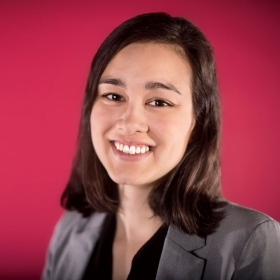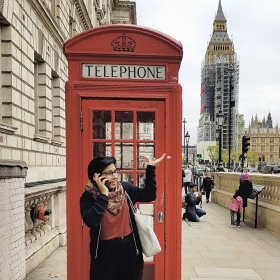Photo by Richard Howard
When Sarah Nzau ’18 waited in line at the airport in Kenya to begin her long journey to Wellesley, she waved good-bye to her family, who were gathered on the other side of a glass barrier. As the first in her family to leave the country, she was nervous, but mostly excited. Many hours later, when she arrived on campus, it finally hit her. “‘You didn’t leave them behind the glass. You left them in another continent.’ So that’s when I started getting confused, and I thought, ‘What did I just do?’”
Looking back on that first day on campus, if Nzau could go back and talk to herself, “I would tell myself, ‘It’s going to be hard, but then, you are going to be more resilient than you realize.’ … I didn’t know how much I could bend and not break, how much I could stretch and just spring back to the same, or even a better, stronger version of me.”
Nzau is one of 18 Mastercard Foundation Scholars who have studied at Wellesley. The women who are selected for the full scholarship are academically talented students from Africa who face significant economic barriers to accessing education, and who are committed to giving back to their communities after graduation. Nzau first learned about Wellesley when Victoria George ’05, who then worked in the Office of Admission, visited Kenya. “The whole time when she was talking, I thought, OK, this seems like a place I can go to,” she remembers.
Nzau’s first semester on campus was a challenging one. She had to learn a new educational system, a new version of English, and many skills that most students arriving at Wellesley already know, like how to include citations in an academic paper. But she also found sources of support. After she handed in that first paper without citations, her professor told her about the Pforzheimer Learning and Teaching Center (PLTC), which offers students services ranging from peer tutoring to study skills instruction. “Ever since then, I’ve been a PLTC fan. I go in there even when I feel like my papers are OK,” she says.
Wellesley’s supportive professors also made a huge difference for Nzau that first year. She would go to economics professor Ann Velenchik’s office hours to talk about an assignment, and “She would say, ‘Oh, yeah, yeah, here are the answers to your questions, but how are you doing?’”
When Nzau arrived at Wellesley, she planned to be pre-med, at her mother’s suggestion. But after taking a biology class her first semester, she quickly realized that was not the path for her. Her second semester, she took Econ 101. “Everything just made sense,” she says. “So much of the world and how I wanted to understand it made sense through the economics lens.” She became an economics major and spent her junior year at the London School of Economics, which was another adjustment. “At LSE, you were on your own. We had no textbooks. We had to learn the world as it is right now and the world as it has been through papers and articles,” she says.
This past January, Nzau was a fellow at the Albright Institute. “It gave me a fresh outlook on why I chose economics, and why economics can be used to solve all the problems that we talked about during the institute,” she says. Her group studied democratic resilience, and she explored how politics and economics interact with each other to influence whether countries can manage conflicts in peaceful ways. “It taught me not to be afraid to combine my interests, which are policy and economics; that both of them can be done together to shape a better world, actually,” Nzau says.
After graduation, Nzau will head back to LSE for a master’s in international social and public policy. But she is certain that someday, she’ll return home to Kenya for good. “Eventually, I see myself as being more helpful and useful in Kenya, because of the challenges that [the country has] and the expertise that’s needed,” Nzau says. And when she does return home, she will have traveled farther than she ever expected that day when she first said good-bye to her family.







We ask that those who engage in Wellesley magazine's online community act with honesty, integrity, and respect. (Remember the honor code, alums?) We reserve the right to remove comments by impersonators or comments that are not civil and relevant to the subject at hand. By posting here, you are permitting Wellesley magazine to edit and republish your comment in all media. Please remember that all posts are public.